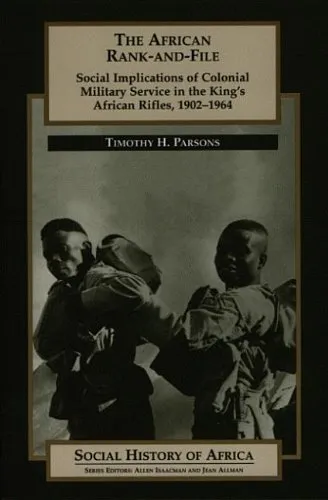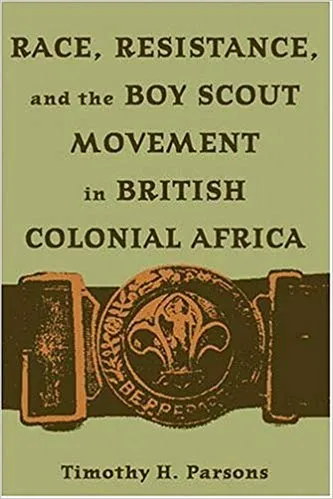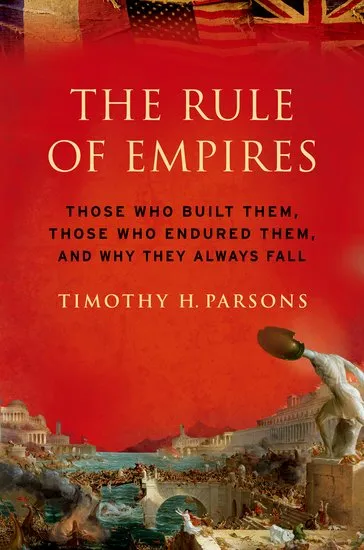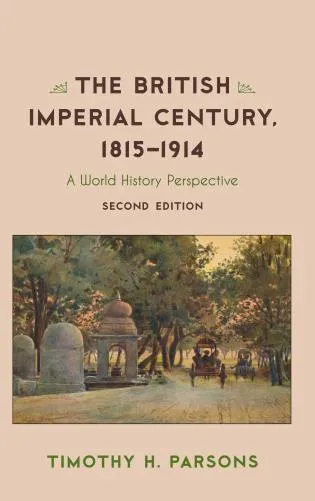https://history.wustl.edu/xml/faculty_staff/11794/rss.xml
View All People
As a social historian of twentieth century Africa, Professor Parsons' research to date has been focused on understanding how ordinary people experienced imperial rule.
Parsons' books to date have explored how Africans from diverse walks of life navigated the shifting realities of repression and opportunity that emerged during the imperial and early national eras. Building on this earlier work, he is currently pursuing several research projects:
- The Historical Geography of Kenyan Identity Formation
- The Imperial Inheritance: The Legacies and Consequences of Empire for East Africa, the West, and the Wider World
- A World History of the Twentieth Century

The African Rank-and-File: Social Implications of Colonial Military Service in the King's African Rifles, 1902-1964
By Timothy Parsons
The African Rank-and-File explores why East Africans in the King's African Rifles (KAR) served a foreign power, which denied them the rights of full citizenship and was at best paternalistic and at worst openly oppressive. The KAR was a viable institution because it advanced, to varying degrees, the interests of the colonial state, the British military establishment, and African soldiers. These interests were quite often contradictory, and it took an ongoing process of negotiation and accommodation over the social status of the African soldiery to make the KAR work. Tensions such as these were not unique to the colonial military; the co-option of Africans as chiefs, policemen, teachers, and clergymen produced similar points of friction. Like other important intermediary classes, African soldiers performed a vital service for the colonial regime and sought to exploit its inherent weaknesses to enhance their position in colonial society. Their ability to do so exposed some of the most fundamental tensions and contradictions of British colonial rule.

Race, resistance, and the Boy Scout movement in British Colonial Africa
By Timothy Parsons
Conceived by General Sir Robert Baden-Powell as a way to reduce class tensions in Edwardian Britain, scouting evolved into an international youth movement. It offered a vision of romantic outdoor life as a cure for disruption caused by industrialization and urbanization. Scouting's global spread was due to its success in attaching itself to institutions of authority. As a result, scouting has become embroiled in controversies in the civil rights struggle in the American South, in nationalist resistance movements in India, and in the contemporary American debate over gay rights. In Race, Resistance, and the Boy Scout Movement in British Colonial Africa, Timothy Parsons uses scouting as an analytical tool to explore the tensions in colonial society. Introduced by British officials to strengthen their rule, the movement targeted the students, juvenile delinquents, and urban migrants who threatened the social stability of the regime. Yet Africans themselves used scouting to claim the rights of full imperial citizenship. They invoked the Fourth Scout Law, which declared that a scout was a brother to every other scout, to challenge racial discrimination. Parsons shows that African scouting was both an instrument of colonial authority and a subversive challenge to the legitimacy of the British Empire. His study of African scouting demonstrates the implications and far-reaching consequences of colonial authority in all its guises.

The Rule of Empires: Those Who Built Them, Those Who Endured Them, and Why They Always Fall
By Timothy Parsons
In The Rule of Empires, Timothy Parsons gives a sweeping account of the evolution of empire from its origins in ancient Rome to its most recent twentieth-century embodiment. He explains what constitutes an empire and offers suggestions about what empires of the past can tell us about our own historical moment.
Parsons uses imperial examples that stretch from ancient Rome, to Britain's "new" imperialism in Kenya, to the Third Reich to parse the features common to all empires, their evolutions and self-justifying myths, and the reasons for their inevitable decline. Parsons argues that far from confirming some sort of Darwinian hierarchy of advanced and primitive societies, conquests were simply the products of a temporary advantage in military technology, wealth, and political will. Beneath the self-justifying rhetoric of benevolent paternalism and cultural superiority lay economic exploitation and the desire for power. Yet imperial ambitions still appear viable in the twenty-first century, Parsons shows, because their defenders and detractors alike employ abstract and romanticized perspectives that fail to grasp the historical reality of subjugation.
Writing from the perspective of the common subject rather than that of the imperial conquerors, Parsons offers a historically grounded cautionary tale rich with accounts of subjugated peoples throwing off the yoke of empire time and time again. In providing an accurate picture of what it is like to live as a subject, The Rule of Empires lays bare the rationalizations of imperial conquerors and their apologists and exposes the true limits of hard power.

The British Imperial Century, 1815–1914 (Second Edition)
By Timothy Parsons
Although Britain's overseas empire may not have been "acquired in a fit of absence of mind," as one of its most prominent historians once alleged, neither was it the brainchild of politicians and bureaucrats in London. Why, then, has so much imperial history been written from this metropolitan perspective? Timothy Parsons strongly contends that the scope and duration of this, the largest of all modern European empires, can only be understood from a non-Western perspective. In an exceptionally concise and informative fashion, The British Imperial Century offers its readers a comprehensive overview of the formation and administration of the empire from its origins in the early nineteenth century, to its climax at mid-century, to its denouement on the eve of the First World War. This was the era in which a previously "informal" empire based on trade and commerce was transformed into a "formal" empire in which trade was often of secondary importance to strategic or political considerations. Parsons devotes chapters to key colonies and regions, many of them overlooked by previous scholars, that include the Indian "raj," Africa, the Middle East, and China. He also considers the long-term consequences of imperialism on the cultures of the colonized and the colonizers alike. An ambitious and thoughtful contribution to the field of imperial history, The British Imperial Century will find a useful place in courses on world history and European history, or as a supplemental text for classes on African, Asian, British, or Middle Eastern history.





